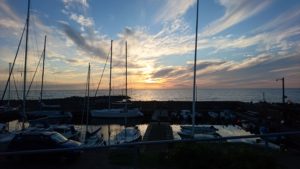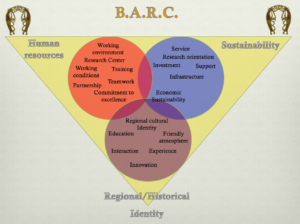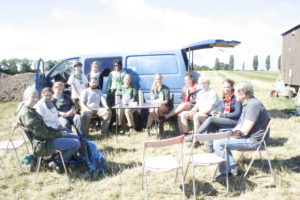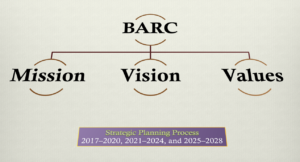The Bornholm Archaeology Research Center (BARC) is a research center for archaeological studies and related disciplines. Located in the Island of Bornholm, Denmark in the Baltic Sea and is widely known for its beauty. Bornholm is also known as the Green Island and has a rich archaeological heritage that spans the entire spectrum of Danish history from the remote Neolithic to the present.
Bornholm is also known as the Green Island and has a rich archaeological heritage that spans the entire spectrum of Danish history from the remote Neolithic to the present.
The goal of research in the Island of Bornholm will be, to enhance our understanding of human development in the Baltic Region throughout its historical lifespan, and at the same time have the opportunity to train human resources in archaeology. With this regard, the opportunity came to light with the discoveries going from Mesolithic time to historical settlements, located in the island with the participation of professional archaeologist and students (private and from several universities) that have share the experience of digging in Bornholm.
 The BARC will be a premier research organization dedicated to the creation, dissemination, and conservation of archaeological knowledge and heritage. The BARC will be home to the departmental Archaeology Program of several national and international universities. It will provide a forum for innovative faculty research, graduate education, and public programs at BARC in an effort to impact positively the academic, local and global communities. BARC wants to be the forefront of archaeological research, education, conservation and publication and is an active contributor to interdisciplinary research in the Baltic Region.
The BARC will be a premier research organization dedicated to the creation, dissemination, and conservation of archaeological knowledge and heritage. The BARC will be home to the departmental Archaeology Program of several national and international universities. It will provide a forum for innovative faculty research, graduate education, and public programs at BARC in an effort to impact positively the academic, local and global communities. BARC wants to be the forefront of archaeological research, education, conservation and publication and is an active contributor to interdisciplinary research in the Baltic Region.
The BARC will seek to change the social context in which archaeological research and training is conducted through the promotion of interdisciplinary research and global collaborations. Our faculty, students and Research Associates will be involved in ongoing field projects that include the development of local archaeological site museums, international student exchanges, training of national scholars, and partnerships with local communities across the globe. We envision that through this type of archaeological practice we will advance the development of a truly global archaeology.
 The BARC will be an organized research unit that is dedicated to education, publication, and conservation efforts across the globe. The archaeology programs of the U. of Gdánsk (Poland), the University of Lund (Sweden), and the FSCyH-UASLP (Mexico) and the U. Aarhus Program in the Conservation of Archaeological and Ethnographic Materials— will be housed at the BARC. The BARC will be also working in collaboration with the Institute for Field Research (IFR) and its associate institutions and universities, as well as the World Heritage Department of the University of California-Merced. The Archaeology, Museography and Conservation Programs will be independent academic units (Interdepartmental Programs or IDPs) within the multidisciplinary program that will contribute significantly to the intellectual environment at the BARC.
The BARC will be an organized research unit that is dedicated to education, publication, and conservation efforts across the globe. The archaeology programs of the U. of Gdánsk (Poland), the University of Lund (Sweden), and the FSCyH-UASLP (Mexico) and the U. Aarhus Program in the Conservation of Archaeological and Ethnographic Materials— will be housed at the BARC. The BARC will be also working in collaboration with the Institute for Field Research (IFR) and its associate institutions and universities, as well as the World Heritage Department of the University of California-Merced. The Archaeology, Museography and Conservation Programs will be independent academic units (Interdepartmental Programs or IDPs) within the multidisciplinary program that will contribute significantly to the intellectual environment at the BARC.
The Center has also considered a broad range of archaeology courses designed to suit all interests – our seminars, symposiums and archaeology courses will range in duration from three weeks to ten weeks. Each one of them will be targeted at a different market – for example: Scandinavian Archaeology, Archaeology of the Baltic Region and Principles in Archaeology.
We also considering archaeology undergraduate students seeking field experience and Academic Credit (modular courses), older students seeking technical courses (Dig, Draw and Digitize) and potential site supervisors (Trainee Supervisor course) – we don’t believe that one size fits all and so we offer a variety of archaeology courses and seminars to a variety of individuals.
Our Modular Courses will be generally taken for University Academic Credit, in the sense that students may apply to have their work in BARC recognized though our in-house assessment process – we will have a standing relationship with several universities in this regard and they issue Academic Credit to our students which then contributes to each student’s degree at their home university.
A hallmark of BARC will be our reputation for the quality of our research center and field school training in the Baltic Region.
In the Island of Bornholm, the BARC will cater for small group sizes with all instruction delivered directly by highly experienced archaeologists and environmental scientists. Following on from our archaeology research at Ringeborg, Vasegård, and Sorte Muld.
The Baltic Archaeological Research Center will be an institution with plenty regulating and ruling faculties in regards to protection and conservation of tangible and intangible cultural heritage, at the forefront thanks to the level of excellence of research in archaeology, anthropology, history, restoration and museology, as well as in professional training within the sphere of its competence.
Our activities will have great social impact since it will cooperate from the beginning with the different levels of government and society in the decision-making processes of developmental plans and programs, for the design and execution of strategies for conservation and knowledge of the national heritage and memory. BARC will aim to perform within this frame of social joint responsibility and improve in infrastructure and resources according to its functions, as well as to, increase the number of highly qualified personnel with sense of duty to attend the public requirements in an opportune and efficient way.
In order to ensure its success, the BARC will establish a long-term plan, with a four-year plan to take account of factors such as the development of ideas regarding the scientific archaeological program; a new working policy; and the decision to develop the center. The BARC has identified four key objectives that it will need to deliver in the next four years to further develop its world-class status.
This project, envisioned by the Bornholm Museum and its partners, has already applied for seed money from EU- Interregional South Baltic Program, for 2017-2020 period, and we are now in the search for more institutions where to apply for grants, donations, and/or sponsorship.


